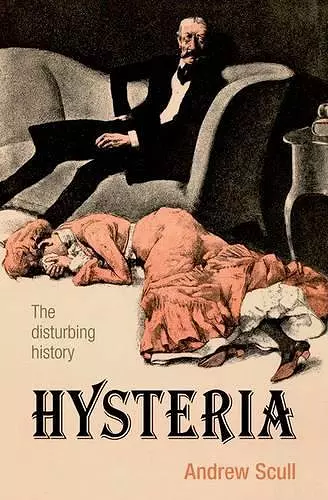Hysteria: The Biography
Format:Paperback
Publisher:Oxford University Press
Published:13th Oct '11
Currently unavailable, and unfortunately no date known when it will be back

This book explores the historical journey of hysteria, a socially constructed illness primarily affecting women, examining its medical, cultural, and societal changes over time, ultimately leading to its decline and reclassification.
In Hysteria, Andrew Scull explores the intriguing history of a condition that has captivated medical and social discourse for centuries. He examines how hysteria, once prevalent and predominantly associated with women, gradually faded from medical practice not due to advancements in treatment, but rather through evolving cultural understandings. Scull delves into the shifting perceptions of hysteria from the 17th century onward, highlighting how societal attitudes towards women and health influenced the diagnosis and treatment of this enigmatic illness.
The narrative reveals that the 19th century was marked by a surge of diagnoses of hysteria among women, often linked to their biology and societal roles. Scull provides vivid descriptions of Charcot's clinics, where patients displayed dramatic symptoms and were subjected to controversial treatments. Notable figures, including Sigmund Freud, visited these clinics, contributing to the development of theories surrounding hysteria. The book also discusses how some contemporaries viewed hysteria as an English affliction, reflecting broader cultural and social dynamics of the time.
As the story unfolds, Scull notes a significant shift during and after World War I, when men began to exhibit hysterical symptoms, often labeled as shell shock. This change in demographic led to a reevaluation of the condition, ultimately contributing to its decline in medical discourse. By the end of the book, Scull raises important questions about the nature of diseases and how they are framed within society, suggesting that while hysteria may have vanished, its legacy persists in modern diagnoses like post-traumatic stress disorder.
Elegantly constructed book... * George Rousseau, TLS *
The stories they tell are often fascinating and alarming - pitched somewhere between farce, genius, horror and a lab report. * The Scotsman *
These four 'biographies' of diseases go far beyond questions of biology or medical practice; they talk politics, sex and class, faith. * The Scotsman *
The notion of an ailment having a birth, a lifespan, and - ideally - a demise...is an illuminating and useful concept. * Wendy Moore, British Medical Journal *
Andrew Scull's exploration...provides an utterly enthralling study of medical ideology and sociology. * Wendy Moore, British Medical Journal *
Should be required reading for all students of medicine. * Wendy Moore, British Medical Journal *
ISBN: 9780199692989
Dimensions: 195mm x 142mm x 19mm
Weight: 258g
232 pages